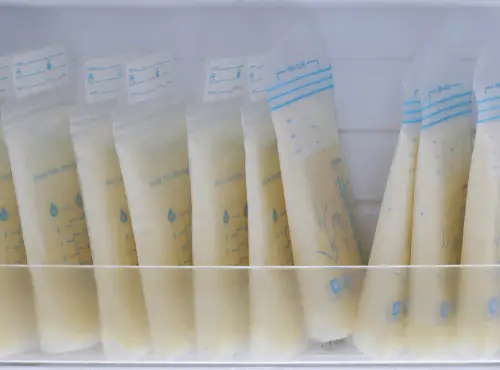Refreezing breast milk might sound like a good option that can provide on-time availability for babies. But, the need to maintain its nutritional quality and safety might make you doubtful to think, can you refreeze breast milk?
You cannot refreeze breast milk once it undergoes the thawing process. The refreezing can further break down the essential nutrients present inside necessary for the health of a baby. Besides, it also increases the chances of bacterial growth. It is best to feed the baby breast milk as fresh as possible to reduce any risk factors.
Breast milk has the natural capability to remain fresh on its own for a long time. However, following the storage guidelines ensures that the health of the baby is not getting compromised.
Table of Contents
Can You Refreeze Breast Milk After Thawing? Is it Safe?
Human breast milk possesses anti-bacterial and immunological properties that make it long-lasting and durable. Ideally, to get the most value out of the milk, it is best to feed it to the baby while in the freshest state.
Refreezing breast milk is not a wise idea. It will cause the milk to lose many of its essential elements and also affect the taste. You do not want to feed your baby poor-quality milk that may cause health problems.
When you are confused about the extra breast milk, you can keep it in the refrigerator for a day or two. The stay should not extend more than forty-eight hours as it can decline the quality of milk.
Similarly, when you keep breast milk in the freezer for an extended time, its antioxidant activity decreases significantly. However, either frozen or refrigerated, breast milk is still way better than formula milk. But, you should avoid refreezing and utilize it after the first round of freezing.
Why Can’t You Refreeze Breast Milk?
Breast milk is proven to consist of elements that are vital for the growth of a child. As babies don’t often follow a set pattern of feeding and get hungry anytime, the availability of breast milk becomes a hassle.
Most lactating mothers prefer to keep the milk inside the freezer or refrigerator. They do this so that the baby’s timetable does not disrupt.
However, research indicates that once the breast milk undergoes the thawing process, it is no more suitable to be placed in the freezer again.
Refreezing can deprive the milk of many rich nutrients, considered essential for a child’s development. It includes a perfect mix of proteins, vitamins, fat, etc.
Secondly, refreezing the breast milk increases the chance of contamination. The constant defrosting and freezing make the milk vulnerable to many microbial infestations.
As a result, it is at a high risk of causing harm to the baby. The baby’s immune system is not able to fight against many diseases. Thus, even a tiny possibility of a health hazard needs avoidance.
Breast milk is better than formula milk. But, in case you are running out of fresh breast milk, it is safer to go for good quality formula milk rather than refrozen breast milk.
Best Alternative To Avoid Refreezing Breast Milk
Breast milk is of prime importance when it comes to your infant’s overall health. You might not want to throw away or waste even a smaller quantity of it.
As evident, refreezing breast milk is not a safer option. So, switching to an alternative method can help in this regard.
Instead of storing all the breast milk together in one bottle, divide them into smaller portions. By doing this step, you can feed the baby with the required quantity needed at one time. Hence, the chance of leftover milk will be minimal to no at all.
Another benefit of storing the expressed milk in separate bottles is the decreased chances of bacterial invasion. When a baby feeds from a bottle, the leftover milk has a high risk of being contaminated. So, it will allow you to give the milk that is safe for the newborn.
Also, you do not have to undergo the tiresome process of thawing and freezing continuously. It will help in saving a lot of time as well.
Storing And Handling Breast Milk
If you are stuck in some work and want that the baby gets fed on time, you can express breast milk and store it for your little one. However, it is necessary to keep the milk in a good hygienic condition, making it secure for the baby.
- You can keep the freshly expressed milk in a refrigerator for up to three days but under proper cleaning protocols. You have to sanitize everything thoroughly that you use during the whole process.
- You can leave the breast milk at room temperature maximum for up to four hours. But, the stay in an open environment must not extend this period as it can get contaminated.
- Make sure to store your milk in a clean breast milk bottle before placing it in the fridge. Keep the milk in the coldest part of the fridge allowing its exposure to a consistent temperature.
- For the freezer, you can use breast milk storage bags specifically designed for this purpose. Avoid overfilling the bottle or bag as breast milk expands while in the freezer.
- Whether you freeze or refrigerate the milk, ensure to label the bottle with the amount and the date of initial pumping. It will act as a reminder and help in managing the stored milk.
Once you take the milk out finally, shake it gently before feeding it to the baby. The stored breast milk tends to separate into layers.
How To Defrost Breast Milk Safely?
It is of crucial importance to defrost breast milk correctly. You have to perform it accurately so that the quality of the breast milk does not get affected.
The following steps are required to thaw the breast milk.
- The ideal way is to defrost it in the refrigerator. Under normal circumstances, it takes around 12 hours to thaw completely.
- You should not leave your breast milk to thaw at room temperature as it is not a safe option.
- When the milk thaws fully, it can stay in the fridge for at least a day (24 hours) without compromising the taste and texture.
- Avoid defrosting your breast milk through heating or microwaving techniques. Exposure to high temperatures can distort the vital nutrients inside it.
- Once thawed, refrain from refreezing the breast milk.
Conclusion
Breast milk cannot be allowed to refreeze under any circumstances. Freezing it twice can alter the taste as well as the overall value of the milk.
Refrozen breast milk is prone to microbial infestation. Thus, it can easily lead to food-borne illnesses like food poisoning, vomiting, diarrhea, etc.
You can freeze the breast milk in controlled portions and not altogether to stop unnecessary food wastage. It will also eliminate the need to freeze it again.
Compared to formula milk, expressed milk yields more benefits if stored accordingly. It should not be allowed in an open environment for long. Transfer them to either fridge or freezer immediately.
Breast milk possesses many vital nutrients that ensure the healthy development of the baby. You should avoid its wastage as much as possible.
Frequently Asked Questions
Why does frozen breast milk smell bad?
Most of the time, frozen breast milk can give an unpleasant smell. It is normal and not something that should cause worry. Breast milk contains an enzyme called lipase that has a lot of benefits. The foul smell with soap-like texture is due to the high level of lipase. It causes no harm to the baby.
Can I use thawed breast milk after 48 hours?
When you leave breast milk in the refrigerator for thawing, it is better to use it between twenty-four to forty-eight hours. If you keep the milk for more than twenty-four hours, it has a potential risk of getting contaminated. Thus, it is not safe for the consumption of the little one.
Does breast milk go bad?
Breast milk can go bad even after you put in your best efforts. Some signs that can indicate spoiled breast milk include a foul smell or a sour taste. If any of these signs appear, it is best to discard the milk as the baby's health is of prime importance.



